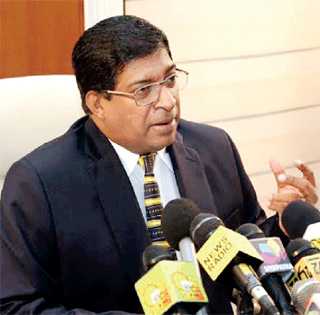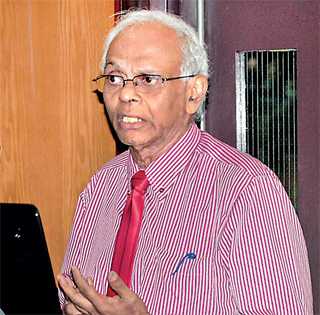Monday Feb 16, 2026
Monday Feb 16, 2026
Monday, 28 January 2019 00:09 - - {{hitsCtrl.values.hits}}
Editor's Note Correspondences on this matter are now closed.
By W.A. Wijewardena
 |
Minister Ravi Karunanayake |
 |
W.A. Wijewardena |
Former Finance Minister Ravi Karunanayake, in a long narrative released to this paper, has, according to the editors, ‘hit back’ at me, demanding a professional response. It is a salutary development that Karunanayake has resolved himself to be a professional in this conversation.
However, professional conversations involve certain etiquettes on the part of the debaters. They were aptly pronounced by Emperor Asoka in one of his stone edicts that in a debate, one should ‘honour his opponents duly in every way on all occasions’. The Buddha in the Brahmajala Sutta in Digha Nikaya advised monks that they should not be offended when others criticise the Buddha and respond to the critics that in this way they were wrong and in that way, they were correct.
Hence, a professional conversation should not include slandering, personal insinuations or name-calling that would lead only to divert the conversation away from the main issues at stake. The main issue here is not the bonds issued by the Central Bank, but the economic consequences of Karunanayake’s policies when he was the Finance Minister and their impact on the Yahapalana Government.
As such, I will give a brief response to his long narrative concentrating only on matters relevant to me. I leave it to the current central bankers to respond to his critique of the bank.
1. About my retirement package: it is good news that Karunanayake has at his disposal ‘a recently retired Deputy Governor’ to supply him with information. There is nothing wrong in one relying on an outsider for technical matters not clear to him. However, this recently retired Deputy Governor has not filled him with all the facts relevant to the bank’s retirement scheme. It would have been better if he had apprised Karunanayake of the following: (1) The bank’s retirement scheme has been in existence since its establishment in 1950, (2) It is a part of the employment contract which the bank enters with an employee, (3) Its objective has been to attract best brains and retain them in the bank (4), An employee has to put in a minimum of 30 years to get the full benefit (5), Most of the package consists of employee’s own savings during his career (6), An employee who has retired 10 years ago does not get the same package as an employee retiring presently (7), Current salaries may be subject to public scrutiny but not the retirement benefits being enjoyed by retirees since the pension funds concerned have a commitment to maintain them without reduction, (8) If it is attempted by any politician, it would give wrong signals to current employees that their future retirement benefits are subject to manipulation.
FT Link
The article titled ‘Ravi K hits back; demands professional reply from Wijewardena substantiated with evidence’ was published in the Daily FT of 25 January and can be seen at http://www.ft.lk/opinion/Ravi-K-hits-back--demands-professional-reply-from-Wijewardena-substantiated-with-evidence/14-671576.
In any case, calling a debater’s retirement package to question is totally irrelevant and unfitting to a professional conversation. Going by that decorum, if someone tries to bring Karunanayake’s personal matters to this conversation, I would be the first to object to it.
2. About the purported irregularities in bond issues in 2008 when I was the Deputy Governor: I would refrain myself from making any comment on this until I see the results of the forensic audit being planned by the Central Bank.
3. About the direct placement of bonds started by A.S. Jayawardena when he was the Governor in 1997: I do not have the privilege of reproducing the confidential Board papers of the Central Bank as Karunanayake has done. However, the relevant sections of this Board paper and the relevant Board decision have been reproduced by the Bond Commission in its report. Hence, had Karunanayake read further down the Board paper and referred himself to the relevant Board decision, he would have noted that, based on the recommendation of the Public Debt Department, the Board has approved of the ‘arrangement proposed in the Board Paper for the subscription by EPF of any shortfall in any issue of Treasury Bonds’. This was the decision taken by the Board chaired by ASJ to issue bonds direct to EPF. Thus, EPF was not only a primary subscriber, but also a direct placement subscriber. Its objective was to prevent a few primary dealers from getting together and cornering the Treasury bond market, thereby affecting the interest rate structure and the bank’s monetary policy. The events that happened after 2015 have proved ASJ correct.
4. Table produced by Karunanayake showing losses to the Government: I would have gone by Karunanayake had he presented the following additional information too: (1) Inflation rate in the country at that time, (2) Interest rates bid by primary dealers when Treasury bonds were offered to them, (3) The monetary policy stance of the Monetary Board at that time, (4) The prices at which bonds should have been issued had the funds been channelled through the auctions, (5) A comparison of the cost of the bond issues compared to the prices offered in the primary market, (6) The yield curve on which each of the direct placements has been made; as the Bond Commission report too has noted, these issues were duly informed to the Board and therefore, to say that they had been issued above the approved rates is a misnomer. The Board during that period was concerned about raising the needed funds and therefore the front office officers of PDD had been given flexibility to raise the funds. What matters is the conclusion by the Auditor General that since ‘a majority of bonds have been issued below the yield curve, they have been raised on the principle of borrowing at the minimum cost to the Government’, thereby generating a premium income to the Government.
5. Monetary Board approval to make direct placement to all the primary dealers: The Board paper which Karunanayake had referred to in his previous conversation is not a paper on direct placements but a paper on the interest rate structure. Direct placements are just a passing reference in the paper. The permission for Public Debt Department to make direct placements with all primary dealers had been granted in 2002 by Minister K.N. Choksy in a special gazette issued when the bank had initiated action tochange from the old paper-based Treasury bond system to scripless securities that were started in 2004. Besides, the Board papers of which Karunanayake had luxuriously reproduced the last pages bore four signatures. Their ownership rested with the Public Debt Department. The meaning of my signature was that it had been submitted to the Board on behalf of the Governor.
6. The decisions taken in the Central Bank are all Monetary Board decisions since the Board has powers to accept, modify or reject a recommendation. Hence, Karunanayake should take up these issues with the Monetary Board and not with me or any other officer of the bank.
As a professional, I wait for the forensic audit report to make further comments. Till such time, I rest my case.